关于网络的英语辩论赛演讲稿
互联网利弊辩论英文稿
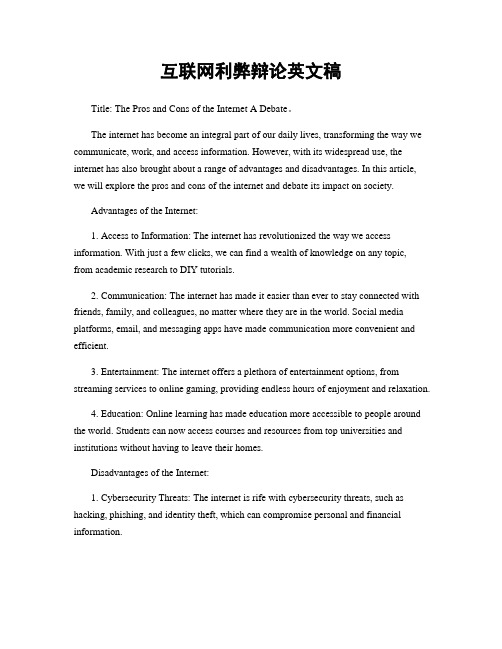
互联网利弊辩论英文稿Title: The Pros and Cons of the Internet A Debate。
The internet has become an integral part of our daily lives, transforming the way we communicate, work, and access information. However, with its widespread use, the internet has also brought about a range of advantages and disadvantages. In this article, we will explore the pros and cons of the internet and debate its impact on society.Advantages of the Internet:1. Access to Information: The internet has revolutionized the way we access information. With just a few clicks, we can find a wealth of knowledge on any topic, from academic research to DIY tutorials.2. Communication: The internet has made it easier than ever to stay connected with friends, family, and colleagues, no matter where they are in the world. Social media platforms, email, and messaging apps have made communication more convenient and efficient.3. Entertainment: The internet offers a plethora of entertainment options, from streaming services to online gaming, providing endless hours of enjoyment and relaxation.4. Education: Online learning has made education more accessible to people around the world. Students can now access courses and resources from top universities and institutions without having to leave their homes.Disadvantages of the Internet:1. Cybersecurity Threats: The internet is rife with cybersecurity threats, such as hacking, phishing, and identity theft, which can compromise personal and financial information.2. Misinformation: The internet is also a breeding ground for misinformation and fake news, which can spread rapidly and have serious consequences on public opinion and decision-making.3. Addiction: The internet can be addictive, leading to excessive screen time and a sedentary lifestyle, which can have negative effects on physical and mental health.4. Privacy Concerns: With the proliferation of social media and online tracking, there are growing concerns about the invasion of privacy and the misuse of personal data.In conclusion, the internet has undoubtedly revolutionized the way we live and interact with the world. While it offers numerous benefits, such as access to information and communication, it also comes with its fair share of drawbacks, including cybersecurity threats and privacy concerns. As we continue to navigate the digital age, it is important to weigh the pros and cons of the internet and find ways to mitigate its negative impacts while harnessing its potential for good.。
互联网的利与弊英文辩论会
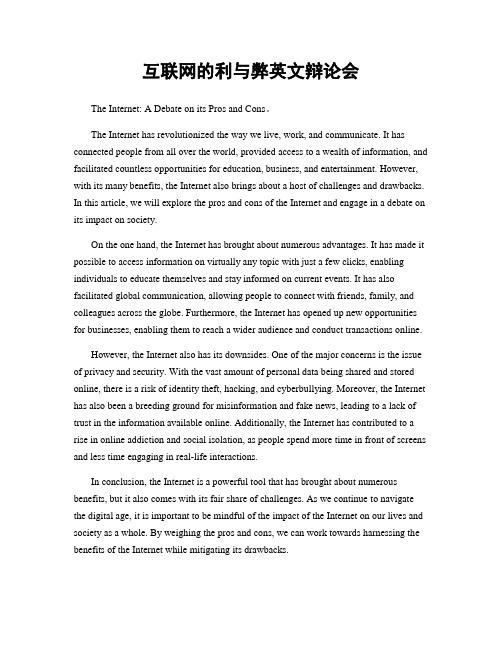
互联网的利与弊英文辩论会The Internet: A Debate on its Pros and Cons。
The Internet has revolutionized the way we live, work, and communicate. It has connected people from all over the world, provided access to a wealth of information, and facilitated countless opportunities for education, business, and entertainment. However, with its many benefits, the Internet also brings about a host of challenges and drawbacks. In this article, we will explore the pros and cons of the Internet and engage in a debate on its impact on society.On the one hand, the Internet has brought about numerous advantages. It has made it possible to access information on virtually any topic with just a few clicks, enabling individuals to educate themselves and stay informed on current events. It has also facilitated global communication, allowing people to connect with friends, family, and colleagues across the globe. Furthermore, the Internet has opened up new opportunities for businesses, enabling them to reach a wider audience and conduct transactions online.However, the Internet also has its downsides. One of the major concerns is the issue of privacy and security. With the vast amount of personal data being shared and stored online, there is a risk of identity theft, hacking, and cyberbullying. Moreover, the Internet has also been a breeding ground for misinformation and fake news, leading to a lack of trust in the information available online. Additionally, the Internet has contributed to a rise in online addiction and social isolation, as people spend more time in front of screens and less time engaging in real-life interactions.In conclusion, the Internet is a powerful tool that has brought about numerous benefits, but it also comes with its fair share of challenges. As we continue to navigate the digital age, it is important to be mindful of the impact of the Internet on our lives and society as a whole. By weighing the pros and cons, we can work towards harnessing the benefits of the Internet while mitigating its drawbacks.。
网络有好有坏的辩论英语作文
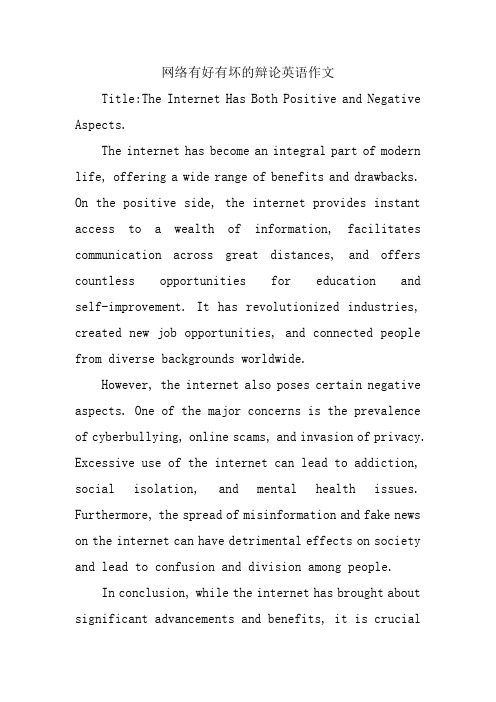
网络有好有坏的辩论英语作文Title:The Internet Has Both Positive and Negative Aspects.The internet has become an integral part of modern life, offering a wide range of benefits and drawbacks. On the positive side, the internet provides instant access to a wealth of information, facilitates communication across great distances, and offers countless opportunities for education and self-improvement. It has revolutionized industries, created new job opportunities, and connected people from diverse backgrounds worldwide.However, the internet also poses certain negative aspects. One of the major concerns is the prevalence of cyberbullying, online scams, and invasion of privacy. Excessive use of the internet can lead to addiction, social isolation, and mental health issues. Furthermore, the spread of misinformation and fake news on the internet can have detrimental effects on society and lead to confusion and division among people.In conclusion, while the internet has brought about significant advancements and benefits, it is crucialto acknowledge and address its negative aspects. By promoting digital literacy, online safety measures, and responsible internet usage, we can maximize the positive impact of the internet while mitigating its potential harm.中文翻译:网络有好有坏的辩论英语作文。
英语网络安全演讲稿(3篇)

第1篇Ladies and Gentlemen,Good morning/afternoon/evening. It is an honor to stand before you today to discuss a topic that is increasingly becoming a critical aspect of our lives: cybersecurity. In this digital age, where technology has become an integral part of our daily routines, we are exposed to numerous risks and vulnerabilities that threaten our personal and professional lives. Therefore, it is essential that we understand the cybersecurity landscape and take appropriate measures to protect ourselves.Introduction----------------The digital revolution has transformed the way we live, work, and communicate. From smartphones to smart homes, from online banking to e-commerce, technology has brought about a world of convenience. However, with this convenience comes a host of cybersecurity challenges that we must address.What is Cybersecurity?----------------------Cybersecurity refers to the practices, technologies, and policies designed to protect systems, networks, and data from cyber threats. These threats can come in various forms, such as malware, phishing attacks, ransomware, and data breaches. Cybersecurity is crucial in ensuring the confidentiality, integrity, and availability of our digital assets.The Importance of Cybersecurity-------------------------------1. Personal Protection:Cybersecurity is essential for protecting our personal information, such as financial data, health records, and social security numbers. A single data breach can lead to identity theft, financial loss, and other serious consequences.2. Business Security:For businesses, cybersecurity is vital for protecting intellectual property, customer data, and financial information. A cyber attack can disrupt operations, damage reputation, and lead to significant financial losses.3. National Security:Cybersecurity is a critical component of national security. Attacks on critical infrastructure, such as power grids, transportation systems, and communication networks, can have far-reaching consequences for public safety and national interests.The Cybersecurity Landscape--------------------------1. The Rise of Cyber Threats:Over the past decade, the number of cyber threats has increased exponentially. Hackers and cybercriminals are becoming more sophisticated, using advanced techniques to exploit vulnerabilities in systems and networks.2. The Role of Cybersecurity Solutions:To combat these threats, organizations and individuals must invest in cybersecurity solutions, such as firewalls, antivirus software,intrusion detection systems, and security awareness training.3. The Human Factor:Despite the availability of advanced cybersecurity solutions, the human factor remains a significant vulnerability. Employees and users oftenfall victim to social engineering attacks, such as phishing emails and spear-phishing campaigns.Key Cybersecurity Best Practices-------------------------------1. Strong Passwords:Create strong, unique passwords for each of your online accounts. Use a combination of letters, numbers, and special characters to make your passwords more secure.2. Multi-Factor Authentication:Enable multi-factor authentication (MFA) on your accounts whenever possible. MFA adds an additional layer of security by requiring more than one method of verification to access an account.3. Regular Software Updates:Keep your operating systems, applications, and antivirus software up to date. Regular updates often include security patches that fix vulnerabilities exploited by cyber attackers.4. Secure Wi-Fi Networks:Use secure, encrypted Wi-Fi networks and avoid public Wi-Fi hotspots when accessing sensitive information. If you must use a public Wi-Fi network, consider using a virtual private network (VPN) to encrypt your data.5. Be Wary of Phishing Attacks:Be cautious of unsolicited emails, messages, and phone calls asking for personal information. Always verify the legitimacy of the sender before providing any sensitive data.6. Backup Your Data:Regularly backup your important data to an external hard drive, cloud storage, or another secure location. In the event of a cyber attack, having a recent backup can help you recover your data more quickly.7. Educate Yourself and Your Team:Stay informed about the latest cybersecurity threats and best practices. Educate yourself and your team on how to recognize and respond to potential cyber threats.Conclusion-----------In conclusion, cybersecurity is a critical concern in today's digital world. By understanding the cybersecurity landscape and implementing best practices, we can reduce our risk of falling victim to cyber threats. As individuals, businesses, and a nation, we must prioritize cybersecurity and work together to create a safer digital environment.Thank you for your attention, and I encourage you to take proactive steps to protect yourself and your digital assets. Remember, in thefight against cyber threats, we are all in this together.第2篇Ladies and Gentlemen,Good morning/afternoon. It is my great pleasure to stand before you today to address an issue that is increasingly becoming a part of our daily lives – cybersecurity. In this digital age, where technology has become an integral part of our lives, the importance of ensuring cybersecurity cannot be overstated. Today, I will discuss the significance of cybersecurity, the challenges we face, and the steps we can take to protect ourselves and our organizations from cyber threats.I. IntroductionThe digital revolution has brought about immense benefits, enabling us to communicate, access information, and conduct business at unprecedented speeds. However, this interconnected world has also madeus vulnerable to cyber threats. Cybersecurity is the practice of protecting systems, networks, and data from digital attacks. It is essential for individuals, businesses, and governments to understand the importance of cybersecurity and take appropriate measures to safeguard their digital assets.II. The Significance of Cybersecurity1. Protection of Personal InformationIn today's digital world, we share vast amounts of personal information online. This includes our financial details, health records, and evenour location. Cybersecurity ensures that this sensitive information remains secure and is not misused by malicious actors.2. Business ContinuityCybersecurity is crucial for businesses to maintain their operations and avoid financial losses. A cyber attack can disrupt business activities, damage reputation, and lead to significant financial losses.3. National SecurityCybersecurity is vital for protecting a nation's critical infrastructure, such as power grids, transportation systems, and communication networks.A successful cyber attack on these systems can have catastrophic consequences for public safety and national security.4. Trust and ConfidenceAs individuals and organizations become more aware of cyber threats, ensuring cybersecurity becomes essential for maintaining trust and confidence in digital platforms and services.III. Challenges in Cybersecurity1. Increasing ComplexityThe digital landscape is becoming increasingly complex, with new technologies and devices being introduced at a rapid pace. Thiscomplexity makes it challenging to keep up with the evolving nature of cyber threats.2. Sophisticated Attack TechniquesCyber attackers are continuously developing new and sophisticated techniques to bypass security measures. This requires cybersecurity professionals to stay updated with the latest trends and technologies.3. Human FactorHuman error is often the weakest link in cybersecurity. Employees may inadvertently fall victim to phishing attacks or fail to follow security protocols, leading to data breaches.4. Resource ConstraintsMany organizations, particularly small and medium-sized enterprises (SMEs), face resource constraints that limit their ability to invest in cybersecurity measures.IV. Steps to Enhance Cybersecurity1. Education and AwarenessThe first step towards enhancing cybersecurity is to educate individuals and organizations about the risks and best practices. This includes training employees on identifying and reporting potential threats.2. Strong Password PoliciesImplementing strong password policies, such as using complex passwords and multi-factor authentication, can significantly reduce the risk of unauthorized access.3. Regular Updates and Patch ManagementKeeping software and systems up to date with the latest security patches is crucial for preventing vulnerabilities that can be exploited by cyber attackers.4. Data EncryptionEncrypting sensitive data ensures that even if it is intercepted, it remains unreadable and secure.5. Network SecurityImplementing firewalls, intrusion detection systems, and other network security measures can help detect and prevent cyber attacks.6. Incident Response PlanningDeveloping an incident response plan can help organizations respond quickly and effectively to cyber attacks, minimizing damage and recovery time.7. Collaboration and Information SharingCollaboration between governments, businesses, and cybersecurity professionals is essential for sharing information and resources to combat cyber threats effectively.V. ConclusionIn conclusion, cybersecurity is a critical issue in the digital age. As technology continues to evolve, the importance of protecting our digital assets from cyber threats will only increase. By implementing the steps outlined in this presentation, individuals and organizations can enhance their cybersecurity posture and contribute to a safer and more secure digital world.Thank you for your attention, and I encourage you to take cybersecurity seriously in your personal and professional lives. Together, we can create a more secure and resilient digital environment for all.[End of speech]第3篇Ladies and Gentlemen,Good morning/afternoon/evening. It is my great pleasure to stand before you today to discuss a topic that is of paramount importance in our rapidly evolving digital age: cybersecurity. In this speech, I willexplore the significance of cybersecurity, the various threats that we face, and the steps we can take to ensure a secure digital world for all.The Digital Revolution and Its ImpactThe digital revolution has transformed our lives in countless ways. From the way we communicate to the way we conduct business, the internet has become an indispensable part of our daily routines. However, with this technological marvel comes a host of challenges, chief among them the need for robust cybersecurity measures.The Significance of CybersecurityCybersecurity is the practice of protecting computers, servers, mobile devices, electronic systems, networks, and data from malicious attacks. It is crucial for several reasons:1. Data Protection: In an era where data is king, the protection of sensitive information is paramount. Personal data, financial records, and corporate secrets are all at risk if not properly secured.2. Economic Security: Cyber attacks can lead to significant financial losses for individuals and organizations. Ransomware, phishing, and other cyber threats can disrupt business operations and lead to costly repairs.3. National Security: Cybersecurity is not just a concern for private entities; it is also a matter of national security. State-sponsored cyber attacks can compromise critical infrastructure, such as power grids and healthcare systems.4. Privacy: The internet has given us unprecedented access to information, but it has also raised concerns about privacy. Cybersecurity measures help ensure that our personal information remains private and secure.The Threat LandscapeThe cybersecurity landscape is constantly evolving, with new threats emerging almost daily. Some of the most common threats include:1. Malware: Malicious software designed to damage, disrupt, or gain unauthorized access to computer systems.2. Phishing: A fraudulent attempt to obtain sensitive information such as usernames, passwords, and credit card details by disguising oneself as a trustworthy entity.3. Ransomware: A type of malware that encrypts a victim's files, with the attacker demanding a ransom to restore access.4. DDoS Attacks: Distributed Denial of Service attacks aim to disrupt the normal functioning of a network or system by overwhelming it with traffic.5. Insider Threats: Employees or contractors with authorized access to systems who misuse their privileges for malicious purposes.Steps to Enhance CybersecurityTo combat these threats, it is essential to implement a comprehensive cybersecurity strategy. Here are some key steps that individuals and organizations can take:1. Education and Awareness: Educate yourself and your team about cybersecurity best practices. Regular training sessions can help reduce the risk of human error, which is often the weakest link in cybersecurity.2. Strong Passwords: Use strong, unique passwords for all accounts. Consider using a password manager to securely store and manage your passwords.3. Regular Updates: Keep your operating systems, software, and antivirus programs up to date to protect against known vulnerabilities.4. Backup and Recovery: Regularly backup your data and ensure that you have a robust recovery plan in place to minimize downtime in the event of a cyber attack.5. Secure Wi-Fi Networks: Use strong encryption and a unique SSID for your Wi-Fi network to prevent unauthorized access.6. Two-Factor Authentication: Enable two-factor authentication on all accounts that offer it to add an extra layer of security.7. Employee Monitoring: Implement monitoring systems to detect and respond to suspicious activity within your network.8. Incident Response Plan: Develop an incident response plan to ensure a coordinated and effective response to cyber attacks.The Role of Government and IndustryGovernment and industry play a critical role in shaping the cybersecurity landscape. Governments can:1. Enforce Regulations: Implement and enforce regulations that require organizations to adhere to cybersecurity standards.2. Invest in Research: Allocate funds for research and development of new cybersecurity technologies and strategies.3. International Collaboration: Collaborate with other countries to share intelligence and resources in the fight against cyber threats.Industry can:1. Set Standards: Develop and adopt industry standards for cybersecurity best practices.2. Innovate: Invest in the development of new technologies that can enhance cybersecurity.3. Transparency: Be transparent about security incidents and collaborate with authorities to address them effectively.ConclusionIn conclusion, cybersecurity is a complex and multifaceted challengethat requires a collective effort from individuals, organizations, and governments. As we continue to embrace the digital world, it is imperative that we prioritize cybersecurity to protect our data, our economy, and our national security.Let us all commit to staying vigilant, educating ourselves, and taking proactive steps to ensure a secure digital world for future generations. Thank you for your attention, and I look forward to any questions you may have.Thank you.。
网络的利弊英语辩论
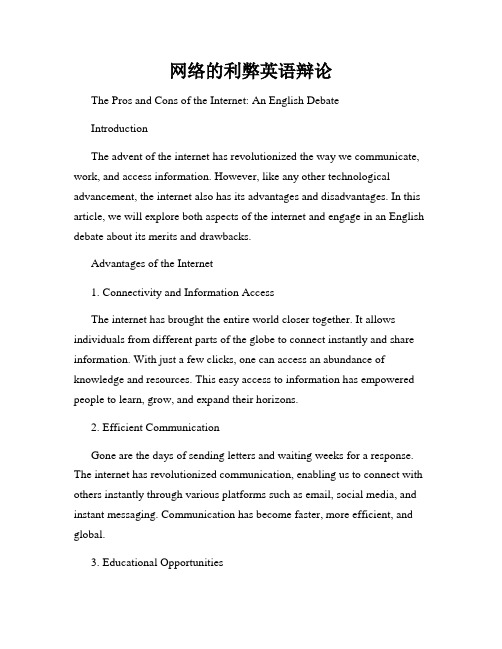
网络的利弊英语辩论The Pros and Cons of the Internet: An English DebateIntroductionThe advent of the internet has revolutionized the way we communicate, work, and access information. However, like any other technological advancement, the internet also has its advantages and disadvantages. In this article, we will explore both aspects of the internet and engage in an English debate about its merits and drawbacks.Advantages of the Internet1. Connectivity and Information AccessThe internet has brought the entire world closer together. It allows individuals from different parts of the globe to connect instantly and share information. With just a few clicks, one can access an abundance of knowledge and resources. This easy access to information has empowered people to learn, grow, and expand their horizons.2. Efficient CommunicationGone are the days of sending letters and waiting weeks for a response. The internet has revolutionized communication, enabling us to connect with others instantly through various platforms such as email, social media, and instant messaging. Communication has become faster, more efficient, and global.3. Educational OpportunitiesThe internet has opened up a world of educational opportunities. Online courses and e-learning platforms provide access to quality education, irrespective of geographical limitations. Students can enroll in virtual classrooms, engage with educators and peers, and even earn degrees, all from the comfort of their homes.4. Economic Growth and Job OpportunitiesThe internet has transformed the business landscape, leading to economic growth and the creation of numerous job opportunities. E-commerce has flourished, allowing businesses to reach a wider customer base. Additionally, freelancing and remote work options have surged, providing more flexibility and employment prospects.Disadvantages of the Internet1. Information Overload and MisinformationWhile the internet provides abundant information, it can lead to information overload. It becomes challenging to discern the authenticity and reliability of sources. Misinformation and fake news spread like wildfire, leading to confusion and societal issues.2. Privacy and Security ConcernsWith the advent of the internet, privacy and security have become major concerns. Personal information is susceptible to hacking, identity theft, and data breaches. Users must exercise caution while sharing sensitive information online and be mindful of cyber threats.3. Social Isolation and AddictionThe internet, especially social media, has been criticized for promoting social isolation. Spending excessive time online can decrease face-to-face social interactions and lead to feelings of loneliness. Additionally, internet addiction has become a prevalent issue, affecting individuals' mental health and overall well-being.4. Cyberbullying and Online HarassmentThe internet has provided a platform for cyberbullying and online harassment. Individuals can hide behind anonymity and engage in harmful behavior, affecting the mental health and confidence of victims. Efforts must be made to combat cyberbullying and create a safer online environment.ConclusionThe internet has undoubtedly revolutionized the world, connecting individuals, providing access to information, and opening up new opportunities. However, it is crucial to recognize and address its disadvantages, such as information overload, privacy concerns, social isolation, and cyberbullying. As responsible users of the internet, we must weigh the benefits against the drawbacks while utilizing this powerful tool for personal, professional, and societal growth.。
网络好与坏的演讲稿英文
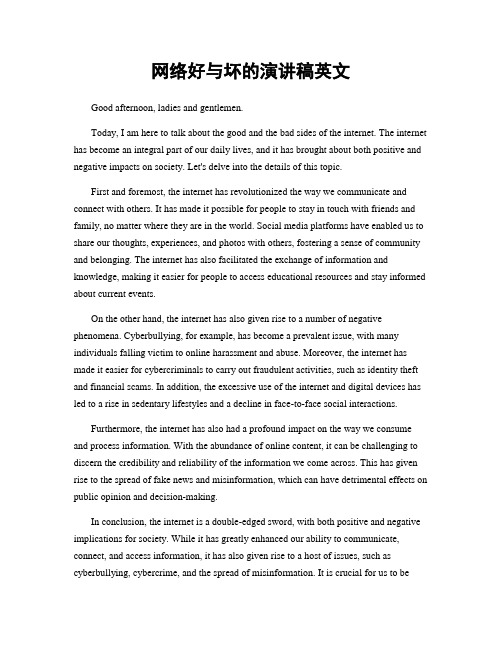
网络好与坏的演讲稿英文Good afternoon, ladies and gentlemen.Today, I am here to talk about the good and the bad sides of the internet. The internet has become an integral part of our daily lives, and it has brought about both positive and negative impacts on society. Let's delve into the details of this topic.First and foremost, the internet has revolutionized the way we communicate and connect with others. It has made it possible for people to stay in touch with friends and family, no matter where they are in the world. Social media platforms have enabled us to share our thoughts, experiences, and photos with others, fostering a sense of community and belonging. The internet has also facilitated the exchange of information and knowledge, making it easier for people to access educational resources and stay informed about current events.On the other hand, the internet has also given rise to a number of negative phenomena. Cyberbullying, for example, has become a prevalent issue, with many individuals falling victim to online harassment and abuse. Moreover, the internet has made it easier for cybercriminals to carry out fraudulent activities, such as identity theft and financial scams. In addition, the excessive use of the internet and digital devices has led to a rise in sedentary lifestyles and a decline in face-to-face social interactions.Furthermore, the internet has also had a profound impact on the way we consume and process information. With the abundance of online content, it can be challenging to discern the credibility and reliability of the information we come across. This has given rise to the spread of fake news and misinformation, which can have detrimental effects on public opinion and decision-making.In conclusion, the internet is a double-edged sword, with both positive and negative implications for society. While it has greatly enhanced our ability to communicate, connect, and access information, it has also given rise to a host of issues, such as cyberbullying, cybercrime, and the spread of misinformation. It is crucial for us to bemindful of the impact of the internet on our lives and to use it responsibly. By doing so, we can harness the benefits of the internet while mitigating its negative effects.Thank you for your attention.。
互联网利大于弊英文辩论
互联网利大于弊英文辩论Title: The Benefits of the Internet Outweigh the Drawbacks。
The internet has become an integral part of our daily lives, revolutionizing the way we communicate, access information, and conduct business. While there are certainly drawbacks to the internet, such as cyberbullying, privacy concerns, and the spread of misinformation, the benefits far outweigh the negatives.One of the most significant benefits of the internet is its ability to connect people from all over the world. Through social media, email, and video conferencing, individuals can stay in touch with friends and family, no matter where they are located. This has strengthened relationships and allowed for greater cultural exchange and understanding.Furthermore, the internet has democratized access to information. With just a few clicks, individuals can access a wealth of knowledge on virtually any topic. This has empowered people to educate themselves, learn new skills, and stay informed about current events. The internet has also made it easier for businesses to reach a global audience, leading to economic growth and job creation.Additionally, the internet has facilitated innovation and collaboration. Through online platforms, individuals can share ideas, work on projects together, and crowdsource solutions to complex problems. This has led to breakthroughs in science, technology, and the arts, benefiting society as a whole.While it is important to address the negative aspects of the internet, such as online harassment and the spread of fake news, it is crucial to recognize the immense benefits that the internet has brought to our lives. By leveraging the power of the internet, we can continue to connect, learn, and create in ways that were previously unimaginable.In conclusion, the internet has undoubtedly brought about significant positive changes in our world. Its ability to connect people, democratize information, and foster innovation makes it a valuable tool for individuals and society as a whole. As wenavigate the challenges of the digital age, it is important to remember that the benefits of the internet far outweigh the drawbacks.。
辩论网络的利与弊英文版_辩论赛_
辩论网络的利与弊英文版小编今天推荐给大家的是辩论网络的利与弊英文版,欢迎大家一起前来浏览阅读。
The internet--a double-edged swordThe internet was born in America and soon spread all over the world. Now days we even can't live with out it. It is so important in morden business, and it widely effect every respect of our lives. Although it provides us a more effective life style, it also brings us so many problems. So it is a double-edged sword in mordern life.The positive respectThe internet is a big electronical net in which there are so many messages from every where of the world. We live in a message explosion times, we only need to sit in front of a computer or any other network terminal, to konw the latest things or to check any thing you don't know. The human civilization never combind like today.The internet also help us save a lot of time. The message was transfered so fast and so vivid that we don't have to walk out or have a face to face meet to resolve some business. Thus we save time and money wast on road.We can make friends via internet. So many couples begine their relationship in internet. It is a better way for morden youngers to find friends.Negative respectThe positive respect seems to have some problems that obsess morden people. The explosion messages were pushed to us whether you need it or not. So we have to spend alot of time to figure out which one is a useful.We don't have to have a face to face talk most time, so it seems we are so close on internt, but we really don't. We feel lonely and strange sometimes.The worst respect is that it grudually eat our health. We sit more and walk less, that caused backbone disease. The computer radiation affect our body, and so many disease are caused by it.在人类发展史上,电子计算机的产生和发展已有一段相当长的历史,。
互联网的利弊英文辩论赛
互联网的利弊英文辩论赛The Pros and Cons of the Internet: A Debate。
The internet has become an integral part of our daily lives, revolutionizing the way we communicate, work, and access information. However, with its many benefits also come a range of drawbacks. In this article, we will explore the pros and cons of the internet in a debate format, weighing the advantages and disadvantages of this powerful tool.Pro: Access to Information。
One of the most significant benefits of the internet is the vast amount of information it provides access to. With just a few clicks, we can find answers to almost any question, learn new skills, and stay informed about current events. This access to information has empowered individuals and contributed to the democratization of knowledge.Con: Misinformation and Fake News。
On the flip side, the internet is also rife with misinformation and fake news. With the ease of publishing and sharing content online, it can be challenging to discern between reliable and unreliable sources. This has led to the spread of false information, conspiracy theories, and the erosion of trust in traditional media.Pro: Communication and Connectivity。
互联网的利弊英语辩论稿
互联网的利弊英语辩论稿第一篇:互联网的利弊英语辩论稿Positive side: Internet does more good than harm Negative side: Internet does more harm than good正方1:Our viewpoint is “Internet does more advantages than harm”.The spreading speed of traditional books, newspapers and magazines is so slow.With the developing of the Internet, people can get plenty of information from the networks quickly and conveniently, and they feel the world become much smaller.For example, we knew the exact news from Internet about the earthquake in WenChuan several minutes after its happening.And the popular word “earth village” can support our opinion, too.反方1:Excuse me, I can’t agree with you.I think Internet do more harm than good.Although we can get information quickly on Internet.But it also brings new problems.For example many Publishing Company went bankrupt, and Many people lost their jobs.At the same time, the copyright status is very bad in China.There is a joke: a young man to Microsoft interview, he answer the interviewer a question and he was driven out.because the interviewer asked him Do you know the price of Microsoft operate system in China? The young man asked: 5 yuan.Is this good to you?正方2:Although the Internet makes some industries closed down, but it has also produced some new industries.The defenders only see the Internet makes some people lose jobs, but do not see the Internet gives more people new jobs, so the defender's point of view is one-sided.With the development of Internet, the communication between people is more easily, we can communicate with others through a lot of ways provided bythe Internet, such as QQ, EMAIL, chat room, and so on.反方2:Please note, you confuse a basic concept, the distance between people is to rely on people themselves to decide, ever not the network.The network is changing people 's way of communication.In the absence of the Internet era, we still can narrow the distance between people, therefore, it cannot be said that the Internet has shortened the distance between people.On the contrary, people put too much effort and emotion in the Internet, reduced face-to-face communication with the family, friends, colleagues, so that the distance between two hearts increased, it makes people become distant.正方3:In addition to the front view of our partners , I think the Internet has created a new way of life.Chat online, checking information online, learning online, or even work online , people can complete many things remain indoors, which is impossible previously.SOHO is now a very popular word, it means Small Office and Home Office.This makes it reality for people to choose the way of life and work according to their own interest and hobbies, without limitation of time and place.反方1:I’m sorry, I don’t agree with you.I feel the Internet can help us to do many thing, at the same time, people become more and more lazy ,more and more weaker, even lost the joy of living.Please look me, my weight is 130 pounds 2 years ago, now I spend much time on Internet, so I am overweight and become weak.正方1:Mr.Yan, I have to say, your point of view is very creative!But, I think the weight problems are not necessarily lined with the popularity of the network!One of the biggest benefits of the Internet is accelerating the flow of information and spreading education to all corners of the globe.Now there are a lot of searching engines on the Internet, such as Google and Baidu, we can get whatever information wewant within only several seconds.Just like an old saying: Xiucai knows everything under the Heaven though he needs not to leave his home.反方2:The other debater please note, you only see the benefits of the Internet, and ignored the existence of a large number of bad information on the Internet, the information has a very bad influence on people, especially teenagers, and even cause them to crime.According to statistics, more than 80% of the minor crime is related to exposure of bad information in the network, some minor to indulge in violence, pornographic games, the game scenes to life, by the game of seduction and lead to crime.正方2:I must remind the other side debaters.It is because of the high speed developing of networks that the adults pay more attention to the young criminals quickly and adopt efficient measure s.Is it not the advantage of the Internet? Let’s think about the invention and using of knife, it has an analogy to the Internet.第二篇:科技利弊辩论科技利弊辩论3辩1.中华文明八千年历史文明就是铁证如山,历史每时每刻都在改变,科技每时每刻都在发展。
- 1、下载文档前请自行甄别文档内容的完整性,平台不提供额外的编辑、内容补充、找答案等附加服务。
- 2、"仅部分预览"的文档,不可在线预览部分如存在完整性等问题,可反馈申请退款(可完整预览的文档不适用该条件!)。
- 3、如文档侵犯您的权益,请联系客服反馈,我们会尽快为您处理(人工客服工作时间:9:00-18:30)。
关于网络的英语辩论赛演讲稿
络的正面影响
1、络有助于创新青少年思想教育的手段和方法。
利用络进行德育教育工作,教育者可以以友的身份和青少年在上“毫无顾忌”地进行真实心态的平等交流,这对于德育工作者摸清、摸准青少年的思想并开展正面引导和全方位沟通提供了新的快捷的方法。
此外,由于络信息的传播具有实时性和交互性的特点,青少年可以同时和多个教育者或教育信息保持快速互动,从而提高思想互动的频率,提高教育效果;由于络信息具有可下载性、可储存性等延时性特点,可延长教育者和受教育者思想互动的时间,为青少年提供“全天候”的思想引导和教育。
还可以上相约,下聚会,实现上德育工作的滋润和补充,从而及时化解矛盾,起到温暖人心,调动积极性,激发创造力的作用。
2、提供了求知学习的新渠道。
目前在我国教育资源不能满足需求的情况下,络提供了求知学习的广阔校园,学习者在任何时间、任何地点都能接受高等教育,学到在校大学生学习的所有课程、修满学分、获得学位。
这对于处在应试教育体制下的青少年来说无疑是一种的解脱,它不但有利于其身心的健康发展,而且有利于家庭乃至于社会的稳定。
3、开拓青少年全球视野,提高青少年综合素质。
上使青少年的第 1 页共 4 页
政治视野、知识范畴更加开阔,从而有助于他们全球意识的形成。
同样,又可提高青少年综合素质。
通过上,可以培养他们和各式各样的人交流的能力;通过在上阅览各类有益图书,触类旁通,提高自身文
化素养。
1, the network contribute to innovation and the ideological education of young people the means and methods. Using the Internet to conduct moral education work, education, either in User's identity and young people in the online “no qualms” real state of mind to carry out an equal exchange, and this for moral education to find out, Mozhun thinking of young people and carry out positive guidance and all-round communication and provides a new
fast-track method. In addition, due to network with
real-time dissemination of information and interactive features, adolescents may be at the same time and a number of educators or educational information to maintain a rapid interaction, thereby increasing the frequency of interactive ideas to improve educational results; because of network information can be downloaded with the nature of , store, etc. character delay, extended educators and educated
第 2 页共 4 页
thinking interactive time for young people to provide
“all-weather” the ideological guidance and education. Meet can also be online, offline meetings, to achieve online moisture and complement the work of moral education in order to resolve contradictions in a timely manner, played a warm heart, motivation, stimulate creativity, role.
2, provides a new channel for seeking knowledge to learn. At present China's educational reesources can not meet demand, the network offers a broad quest for knowledge learning school, learners at any time, anywhere access to higher education, students learn in school to learn all the courses, Xiuman credits, access to degree. This is
exam-oriented education system in young people is undoubtedly one of the best relief, it is not only beneficial to their physical and mental development, but also conducive to the family and even social stability.
3, open up young global vision to improve the overall quality of young people. Access young people's political vision, knowledge, more open areas, thereby contributing to the formation of their global consciousness. Similarly,
第 3 页共 4 页
young people can also improve the overall quality. Through the Internet, you can train them and their ability to communicate a wide range of people; through online access all kinds of useful books, comprehend by analogy, to improve their cultural attainment.
第 4 页共 4 页。
